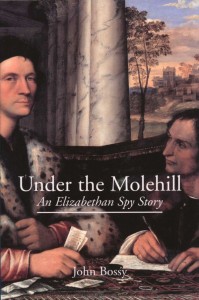As a grad student, reading a monograph and not necessarily understanding it is not an uncommon thing. Indeed, one often gets bogged down in theory, confused by the use of unfamiliar types of evidence, and sometimes even the very essence of the argument itself. I strive to find the positive in every book I read, even if it is outside of my field or areas of interest (both temporally and spatially). But then there was John Bossy’s ‘Under the Mole Hill…’
As I pointed out in class yesterday, the selection of the book as the BBC History Magazine book of the year represents a very different impression of the work than the one we all collectively constructed (with the exception of D.E., sorry). To look at the back cover of the book once more, the quotes offer further examples of the disparity between our opinions and those of high literary minds. This quote truly illustrates that point: ‘John Bossy tells this story with all his familiar narrative flair,’ by Ralph Houlbrooke of the Times Literary Supplement. While his narrative prose was nice, and actually pleasant, when it appeared, it was hampered by his uneven and often confusing analysis. His attempt at leaving a trail for his reads to follow turned into a spasmodic spreading of breadcrumbs leading to frustration and aggravation.
As we touched on in class yesterday, the audience for Bossy’s work was profoundly limited, perhaps even within a microcosm of a microcosm of a microcosm of the academy in Yorkshire. Indeed, Bossy’s history of an ‘Elizabethan Spy Story’ is the epitome of the micro-history. During the discussion yesterday, it was postulated that maybe this was Bossy’s response to the movement of writing accessible, almost meta-narratives in the hopes of reaching an audience beyond the confines of academia. If this is his proverbial middle-finger to that turn in historical writing, imagine his response to something pedestrian he might take offense to.
This post is a testament to my contempt and loathing of this book. I have rambled on for over three hundred words now in an attempt to avoid engaging with the book itself. I typically enjoy scholarship which engages in a difficult, thought provoking question or problem. Yet, I am at an absolute loss. The one positive I can offer it that at least it was short. But perhaps the subject would have been better served by a work twice as long. Good lord…what have I just suggested?! Indeed, my only positive comment is in fact a negative.



Chris,
I have to completely agree with you about the book. I could not get more than ten pages without losing my place or Bossy’s trail of thought because it seemed like he was losing his trail of thought himself. Rather than writing a cohesively designed narrative-style monograph, he repeatedly backs up, narrating his own life, which I think removes some of his credibility, especially when he discusses his own flawed paths of logic, as in his discussion on handwriting styles. While I understand that John Bossy may, in fact, be an extremely credible historian, whose typical writing is fantastic, it would be difficult to for anyone to get me to read his work again. That is, of course, unless it’s required for another class.
Well, as Peggy has yet to run the commenting portcullis up, and protocol suggests that the grads should foster the clubby atmosphere common to these internecine interstices of the academy, I’ll join issue on Bossy for the nonce. I’m no fan of the TLS at the moment, as a computer bug of theirs appears to have set me back $85 on a $12 subscription, but they’re a good indicator of the British academic establishment. (Most of whom read the LRB.) When a distinctly non-populist book is published in mass market format, and the TLS talks about (or at least blurbs) the narrative flair, it suggests that we’re in an odd moment within an odd field. (British history, even populist British history, is famously idiosyncratic. If I remember right, I think the readers of the Guardian recently voted the Overbury Scandal the most significant scandal in the history of the nation.)
Writ large, here’s the argument. Jesuit and non-Jesuit historians have been going back and forth over whether the mole was the secretary or not. Absent Bruno, the only answer that wraps everything up nicely is that it was the clerk. Bossy, out of thin air, suggests a meeting between Walsingham’s agent and the clerk on or about the 23rd of April in some year or other. With this rendezvous, the messy complicities seem to vanish. This is a tremendously interesting text.
That said, I could only closely track 109 pages in 5 hours, so your point is well taken.
Chris, I laughed out loud when I read your post. You are so right. Your mention of the praise for the book leads me to question how exactly literary praise on the backs of books is acquired, and if perhaps people who write them have particular motivations for writing a review praising a book that may not deserve praise or that they may not have in fact found to be good work. Additionally, I will admit that Bossy’s prose was not disagreeable in the least, however you are absolutely correct that his evidence is presented in a less than desirable way.